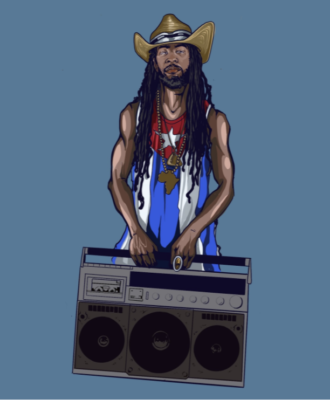Any native New Yorker will tell you; Manhattan has long been the epicenter of “making it”. While the outer boroughs relegated to secondary status. But don’t sleep, places like Brooklyn, Queens and the Bronx have turned out cultural treasures known the world over. One look no further than the Bronx giving birth to hip hop.
The documentary Bakosó: AfroBeats de Cuba, shows the same is going on in Cuba. For many natives, Havana is ground zero for all things of cultural importance. Yet, in the outskirts of the island nation – artists are inspiring, creating and making – the latest contribution is an entirely new genre of music called Bakosó – a genre which at its core leans heavy upon contemporary African music, while adding elements of traditional Cuban clave and reggaeton.
Directed by Puerto Rican filmmaker Eli Jacobs-Fantauzzi, the film follows the journey of Isnay Rodriguez, also known as DJ Jigüe, the founder of the first independent Afro-Cuban music label on the island. Jigüe’s odyssey goes back to get to the present. Leading him first to his hometown of Santiago which is considered to be Cuba’s cultural capital and the center of African diasporic movements. As he encounters challenges along the way, audiences are transported to Cuba, learning about the complex and beautiful elements and witnessing, the artists, fans and communities creating with little in the way of resources and technology and embracing the sounds that make up Bakosó.
founder of the first independent Afro-Cuban music label on the island. Jigüe’s odyssey goes back to get to the present. Leading him first to his hometown of Santiago which is considered to be Cuba’s cultural capital and the center of African diasporic movements. As he encounters challenges along the way, audiences are transported to Cuba, learning about the complex and beautiful elements and witnessing, the artists, fans and communities creating with little in the way of resources and technology and embracing the sounds that make up Bakosó.
We see DJ Jigüe as he treks from the “most Caribbean city of Cuba” to its various provinces such as Palma Soriano, to piece together the origins of Bakosó, learn from its creators and reconnect the Afro-Caribbean infusion with its diasporic roots. As the Havana-based DJ untangles the rise of Bakosó, the film spotlights the younger generation of tastemakers leading the new wave of Cuba’s sound.
It’s clear there is something going on here, something that the rest of the world has yet to catch on to. Bakosó (which essentially means “turn up”) is its own unique sound separate from other diasporic sounds. The cultural movement began in the mid-2000s when a group of African medical students, abroad for their exchange program, brought the high-jacked rhythmic intonations of Afropop and Angolan kuduro to the shores of this Caribbean nation.
“The majority of the rhythms that come to the Caribbean come from Africa, and when they come to Cuba, they transform, and new genres and styles are born. That’s what’s happening in our streets,” Jigüe explains in the visual’s three-minute trailer. And what’s happening in the streets of Cuba, just maybe the music world’s next big thing!
The 50-minute documentary has made the festival rounds but will be making its broadcast premiere May 3rd on PBS. See the trailer here.
